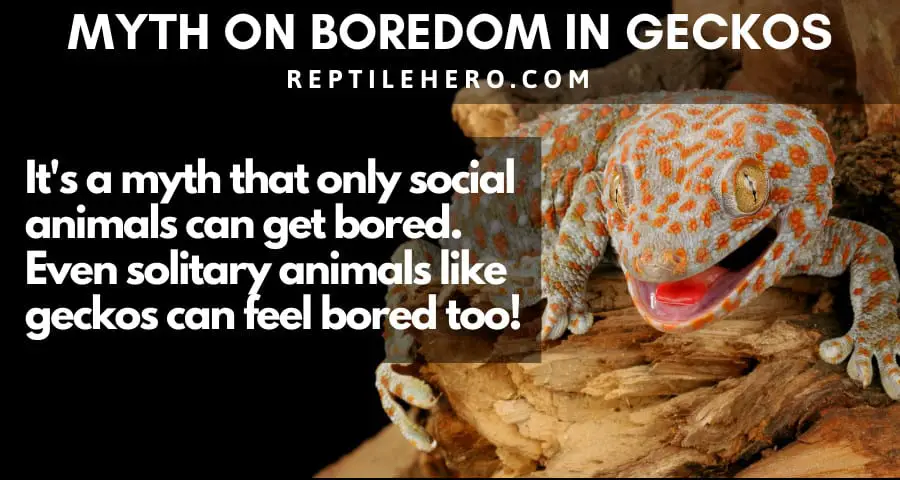Do Geckos Get Bored? (The Answer Will Shock You!)
Bored is an adjective you would rarely ever see in the same sentence as the word gecko. However, I’m pretty sure that many newbie gecko owners and breeders have thought about both at least once. So what does science have to say about geckos and boredom?
Generally speaking, geckos and many other reptiles can indeed experience boredom that might trigger play behaviors in the pet. As such, it is important to provide them with novelty in feeding, environment, and activity. Providing them with such extensive enrichment will improve their overall well-being.
Geckos have long been thought of as simple “display” pets that are only cool to observe. But this kind of mentality should be challenged. Otherwise, newbies will mistakenly think that enrichment is not needed because geckos can’t become bored of the mundane.
Can A Gecko Experience Boredom?
A gecko, like most other animals, can get bored. Though there are very few studies on the topic of animal boredom, scientists theorize that boredom may be more observable in captive specimens than in wild geckos. This may be because of excess energy due to their very comfortable and risk-free life in captivity.
If you had asked me this question just a couple of years ago, I would have probably told you “no” with a deadpan face. Actually, you probably would have gotten a unanimous no within the gecko-keeping community.
When in captivity, leopard geckos have nothing to worry about. All their needs are provided for by us, their pet parents. So some people ask, what more could our cute little geckos ask for? The answer is novelty.
Simply put, our pet geckos are more likely to experience boredom exactly because we give them every single thing they would ever need to ensure their survival.
In doing so, we inadvertently deprive them of the chance to actively engage in natural behaviors, like burrowing, climbing, and jumping, which will help them stay fit and thrive [1].
It’s pretty much the same for humans. When you’ve got your hands full with your studies, job, chores, and what have you, you probably won’t feel bored because you are always preoccupied. Well, that or you would wish to have some free time to relax and rest.
But if you have nothing to worry about and you are already accustomed to a variety of luxuries at home, you are bound to feel bored too! You will seek new experiences, foods, and locations—anything to be able to feel like you are a productive member of society.
Why Do Geckos Get Bored? (4 Reasons)
Experts believe that the following reasons can explain why pet geckos experience boredom while in captivity: lack of stimulation, sterile environment, neurological phenomenon, and survival instinct.
Now, let me explain to you how these factors can lead to boredom in our cute little geckos. Unsurprisingly, they are all interconnected.
Don’t worry though! I won’t get too technical here.
1. Lack of Stimulation
Some people prefer to laze around all day and have nothing to worry about. I find that this is especially true for people who can’t take a break from work and school.
This could also probably apply to wild geckos who have to worry about their food, shelter, predators, and potential competition. They would probably appreciate some peace too.
But the same can’t be said about our geckos. Since we take care of all their needs, they are left with very few options to do with all the time they have. Hence, captive geckos will inevitably get bored because of the monotony (lack of stimulation or variety) in their lives.
This is further evident when pet geckos are kept in tanks that lack novel stimuli, which brings me to my next point.
2. Sterile Environment
The misinformed belief that geckos are very low-maintenance reptiles to keep as pets has unfortunately resulted in them being kept in barren enclosures.

More often than not, these small and sterile setups only contain the bare minimums—a hide or two, bowl, and artificial flooring—if any at all. In such cases, geckos are not only severely under-stimulated, they are also significantly deprived.
Nevertheless, even if a gecko is kept in a relatively more furnished vivarium, the likelihood that it will grow tired and bored of its surroundings still exists. More specifically, if a gecko cannot act out all of its natural behaviors, like climbing and burrowing, it can still experience boredom.
3. Neurological Phenomenon
A few experts theorize that geckos may also be naturally disposed to feeling bored when not stimulated enough because of their brains.
Since certain brain structures in humans have already been linked to the occurrence of boredom, we could also expect that certain reptile brain structures can activate this feeling in geckos.
There may be specific parts of the brain that induce boredom when a gecko receives a cue for it. A cue could be mental, physical, and/or environmental.
However, nothing is certain yet as no detailed study has been conducted to primarily explore boredom in geckos yet. Or at least, none that I’m currently aware of.
4. Survival Instinct
Another possible explanation for boredom in geckos is that it has an adaptive value for geckos, regardless if they are in the wild or in captivity.
In a way, boredom ties into curiosity, which is related to multiple complex cognitive activities that ensure survival such as problem-solving.
So boredom can have a motivating effect for geckos in terms of exploring their surroundings and learning, in general. Both of these are highly crucial for a gecko to live its best life.

Why Do People Believe That Geckos Can’t Get Bored?
Common arguments made to prove that it’s impossible for geckos to feel bored claim that geckos are simple, slow, and solitary reptiles. However, these arguments are not backed up by evidence. In fact, some of these reasons are now considered outdated.
Let me show you how these commonly held notions and/or myths are misleading—if not completely false.
1. Myth: Geckos are very simple creatures so they can’t be bored.
As long as they are given an enclosure, heat lamp, and some food, they’ll live long happy lives. They don’t need anything else. At least that’s what many people think.
But if we carefully think about it, wouldn’t they be more likely to feel bored if they have everything they need at their disposal? If they have so much free time on their hands, they are bound to feel restless and bored sooner or later.
Unlike wild geckos who have to worry about securing a refuge site, hunting for live insects, foraging for fruits, and evading predators, pet geckos are extremely pampered. The dark side of that is that our scaly babies can become under-stimulated—in simpler terms, bored.
2. Myth: Geckos lack the high-level cognitive ability needed for them to feel bored.
Boredom is typically related to high-level mental activities, or in this case, the lack thereof. Sadly, many people—even reptile keepers and breeders—severely underestimate just how smart geckos can be.
Learn more about the cognitive abilities of reptiles in our article on gecko intelligence.
The truth of the matter is that geckos are capable of engaging in various activities that require high-level cognitive skills. Such activities include strategic hunting. So who’s to say that they can’t experience boredom?
3. Myth: Geckos are solitary animals so they can’t be bored like social animals.
There is a widely held notion that only very social animals can acknowledge a lack of stimulation, and therefore being able to feel bored is reserved for them alone.
However, we need to keep in mind that stimulation does not only come from social interaction. Geckos can get stimulation from their food and their surroundings as well!
Furthermore, let’s not forget the fact that a few gecko species, like mourning geckos (Lepidodactylus lugubris), are more social by nature.
4. Myth: Geckos are reptiles so they can’t be bored like mammals.
Some people believe that only mammals are capable of being bored. As such, applying boredom to geckos is a problem of anthropomorphism. Recently though, more and more scientists closely dealing with reptiles say that anthropomorphism isn’t totally a bad thing [2].
This is especially the case when being able to relate to our cold-blooded critters encourages us to make sure that they’re living their best lives in our care. Because the good thing about it is that it pushes reptile owners to constantly look for ways to improve husbandry practices.
How Can You Tell If a Geckos is Bored?
When a gecko is bored, it will typically display abnormal, repetitive, and unproductive behaviors which are not associated with any other illness. In severe cases, a gecko that is extremely bored may engage in risky behaviors just to feel stimulated.
Unlike humans, geckos and most other pets can not verbally express that they are bored. So how can we distinguish between a gecko that is indeed bored and a gecko that is simply calm and comfortable?
Well, there are plenty of signs to keep an eye out for!
Here are 10 signs that may help owners tell when a gecko is bored [1, 3]:
- Lethargy
- Restlessness
- Biting onto non-food items
- Abruptly jumping
- Rolling around
- Excessive grooming
- Play behaviors
- Courtship behaviors in the absence of a potential mate
- Sensation-seeking, which could be dangerous
- Explainable incidents of self-injury
Just keep in mind that some of these may also be a symptom of a serious condition, so make sure to rule those out. Only then can you determine that your gecko is indeed bored and not actually sick.
3 Practical Ways to Prevent Your Gecko From Getting Bored
Overall, providing a gecko with variety during feeding, an enriched enclosure, and safe opportunities that encourage activity will prevent it from feeling bored.
Enrichment is something that you have probably heard of if you are a part of any reptile-keeping groups—be it online or in person. So you are most likely aware of how it can greatly improve the well-being of all pets, including reptiles [4]. If you didn’t know that before, now you do!
All three of the factors I mentioned above are effective forms of enrichment, so I will be sharing with you exactly how to keep your gecko entertained using these methods.
But please bear in mind that even reptiles have individual preferences. You might have to do a bit of trial and error to find out which one works for your gecko. Better yet, do all three.
1. Variety in Feeding
Reptile caretakers can prevent geckos from getting bored by offering them a variety of food and ways of obtaining it.
When all necessary reptile husbandry factors are well-accounted for and provided, many experienced owners do notice that geckos become more active. The ironic thing about that though, is that geckos could be quick to get bored—especially when it comes to feeding.
Variety is Key
Oftentimes, I notice that really pampered geckos become super picky with their insects. Many vets agree with me on this too [5]. In this sense, they are just like spoiled little kids.
To avoid this, they should be given a wide variety of live feeders as early as possible. In doing so, they don’t get bored of eating specific insects. This is extremely important for insectivorous reptiles like leopard geckos (Eublepharis macularius) in particular.
Besides that, make sure that your frugivorous lizards, such as crested geckos (Correlophus ciliatus), also get a varied diet of not only insects but also fruits and vegetables.
Find out more about good fruits and vegetables in our article on foods geckos can eat.
Work in Exchange for Food
Another thing is that you should refrain from only feeding your gecko with a tong or by hand, without any challenge whatsoever. You should give them obstacles to go through or problems to solve before giving them a feeder to chomp on.
Unless your gecko has special needs or a condition that prevents it from effectively moving around, I highly recommend that you let your gecko hunt for its prey as it would in the wild.
2. Enriched Enclosure
Many reptile experts recommend giving geckos an enriched environment inside their enclosures to prevent boredom. In doing so, they can feel safe while exploring their surroundings for stimulation.
Below, you can find different objects, features, and equipment that can be used for habitat enrichment in gecko tanks:
- At least three hides (here on Amazon)
- Different plants (real and/or fake)
- Climbing accessories (e.g., ladders here on Amazon)
- Textural accessories (e.g., rocks, wood, etc.)
- A deep diggable substrate or a dig box
- Tunnel and cave systems
- Multiple habitable levels using ledges and/or hammocks
- A good basking spot
- Heating elements (e.g., halogen, carbon projectors, etc.)
Learn more different heat sources in our article on the best heating setup for geckos.
However, do make sure to design your gecko’s enclosure in a way that’s suitable for its species’ specific needs. Keep in mind that terrestrial and arboreal geckos differ in the way they utilize and move around their enclosures—as they do in the wild.
For instance, fat-tailed geckos (Hemitheconyx caudicinctus) more easily move around the substrate. In contrast, gargoyle geckos (Rhacodactylus auriculatus) prefer staying above ground, in shrubs and trees.
3. Opportunities for Activity
Giving geckos opportunities to engage in novel activities can also prevent boredom. This can be done inside and outside their vivariums. Ideally, such opportunities should involve the use of various senses to increase their involvement in the task.
Because geckos are ectothermic animals that conventionally conserve their body heat and energy reserves, we won’t normally see them moving around without a practical purpose (e.g., hunting, thermoregulation, etc.).
However, physical activity can greatly benefit well-fed geckos that are otherwise not that active. Mazes, for example, give geckos both mental and physical challenges.
Just to be clear, though, activity does not necessarily imply depleting their energy. Geckos don’t need to engage in strenuous sports or anything like that to be entertained and move around.
Even just adding something new to their cage from time to time can keep them curious, and prompt them to explore. This method seems to work especially well when it comes to things with novel scents.
You could also spend some quality time with your gecko with regular handling sessions!
Further Questions
Can boredom negatively affect a gecko’s well-being?
Sustained and inescapable boredom in geckos can result in a variety of welfare issues including, but not limited to, distress, risky behavior, sleeping problems, and brain damage. These effects can be mild, moderate, or severe. However, when allowed to resolve it, boredom can facilitate adaptive and flexible behaviors in geckos.
Do geckos need entertainment?
Geckos do not need entertainment per se. Rather, geckos need enrichment to prevent boredom and the negative consequences that come with it. Keepers and breeders also have the option to play with their geckos. It does need to be extremely complicated or physically demanding.
Do geckos play?
Play behavior has only been properly documented by scientists once in geckos—thick-toed gecko (Chondrodactylus turneri). However, many experienced gecko keepers and breeders have also shared that they have observed geckos playing. Moreover, since geckos are capable of experiencing boredom, they are likely to engage in play in response to it.
Is it okay to give your geckos a toy to play with?
Yes, gecko owners can give their pets toys to play with. However, they must make sure that it cannot harm the gecko through ingestion, physical contact, etc. The toy does not need to be high-tech, complicated, or expensive for it to be effective. Moreover, it’s advisable to only let geckos play with it from time to time so it retains its novelty.
Is it safe to play with a gecko using a laser pointer?
Can I let my gecko explore outside its tank while it’s in a hamster ball?
It is not recommended for reptile keepers and breeders to place geckos into hamster balls as there are numerous dangers in doing so. Experts recommend out-of-tank handling sessions instead. This is much safer, especially when done correctly—closer to the floor or on top of a soft surface (e.g., bed, couch, etc.).
Summary of Do Geckos Get Bored?
Geckos and other reptiles commonly kept as pets have an increased likelihood of demonstrating boredom. They may feel bored because they are not mentally and physically stimulated enough, among many other reasons.
There are several tell-tale signs that an owner can look out for to know if a gecko is feeling bored. Such signs are typically purposeless, recurrent, and atypical behaviors, which are otherwise called stereotypic.
Food, habitat, and sensory enrichment can prevent and resolve boredom, which, in essence, improves the overall welfare of pet geckos.
Sources
[2] https://www.tandfonline.com/doi/full/10.1080/08927936.2022.2051934
[3] https://paws.org.ph/why-wild-animals-do-not-make-good-pets/
[4] https://vet.ucalgary.ca/community/learning-animal-health/animal-interactions/reptiles-and-husbandry
[5] https://www.bridgevilleanimalhospital.com/articles/general/514328-diet-and-nutrition

![Deep Heat Projectors For Leopard Geckos? [Final Guide]](https://www.reptilehero.com/wp-content/uploads/2021/08/gecko-deep-heat-projector-small-cover-infographic.jpg)
![5 Causes of Denting on Your Gecko Eggs [and 4 Solutions]](https://www.reptilehero.com/wp-content/uploads/2021/03/G38-768x614.jpg)
![How to Choose a Halogen Lamp for Your Leopard Gecko [In-Depth]](https://www.reptilehero.com/wp-content/uploads/2021/07/word-image.jpg)

![Does a Leopard Gecko Really Need a Heat Lamp? [Final Guide]](https://www.reptilehero.com/wp-content/uploads/2022/03/Do-geckos-need-heat-lamp-cc-768x614.jpg)
